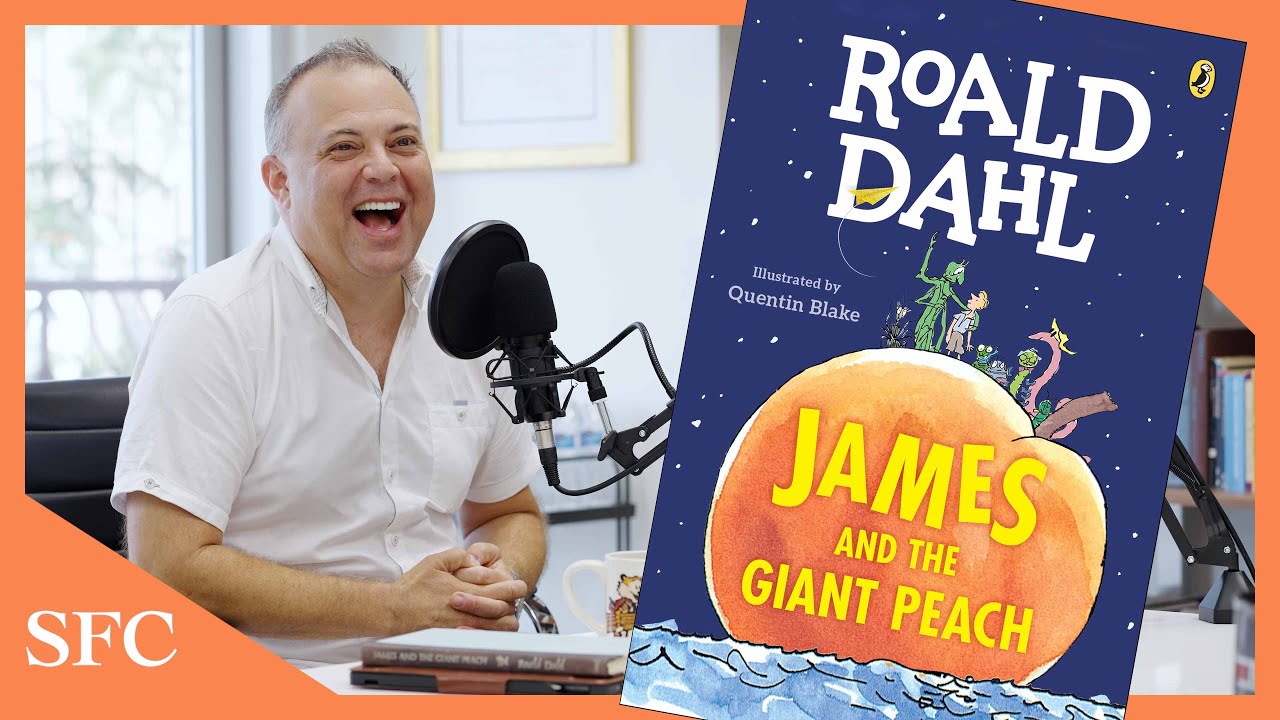In this episode, Mike sits down with SFC’s Head of Schools, Rod Gilbert, for the sixth installment of the Eagle Perspective’s mini-series “A Yard of Books.” Mike and Rod talk about James and the Giant Peach by Roald Dahl, James’ character development, and how Dahl discusses trauma in his work.
Mike Siciliano, High School Dean of Students, has a long history with Sante Fe Christian, sitting in several roles including alumnus, US history teacher, and football coach. As a student, Siciliano felt he had teachers and coaches who personally invested in him and made a huge difference in his life. Now, he tries every day to continue that legacy for current SFC students, live up to the standard his teachers set for him, and have a lot of fun.
Rod Gilbert, brings a fresh perspective as SFC’s Head of Schools. As a strong leader with a shepherd’s heart, Rod encourages SFC’s faculty, coaches, and staff to strive for excellence in all they do. At his core, Rod is an educator who wants children and their parents to see the world as something lovely, worth exploring and redeeming through Christ.
Highlights
00:00:00 – Introductions
00:01:56 – Overview of James and the Giant Peach
00:03:13 – The first moral of the story
00:04:30 – First banned book but perfect for children
00:06:49 – Readers see how James manages different aspects of a personality through the insects
00:07:52 – How James is different at the end of the book compared to the beginning
00:11:44 – Possible reasons why Dahl’s books involve trauma
00:14:29 – What changed Rod’s opinion of the movie version to now liking it
00:16:15 – Vision of how SFC can help students through coming of age, dealing with trauma, and growing through resilience
00:24:54 – Recommendations of other Dahl books
00:27:43 – Evolution of James from victim to hero
Transcript
Mike Siciliano [00:00:06] Welcome back to another episode of our Eagle Perspective Podcast. I’m Mike Siciliano, Dean of Students of the High School. I’m here once again continuing our Yard of Book series with our Head of Schools, Rod Gilbert. Rod, thanks for being here today.
Rod Gilbert [00:00:19] Thanks for having me, Mike.
Mike Siciliano [00:00:19] Today is our first video podcast.
Rod Gilbert [00:00:23] Yes.
Mike Siciliano [00:00:24] For some reason someone thought it would be a good idea if they could see us.
Rod Gilbert [00:00:29] Yeah, that’s a problem.
Mike Siciliano [00:00:30] At some point we should start questioning the wisdom of these decisions.
Rod Gilbert [00:00:34] Well, we were both out of town for a while. A lot of decisions were made while we were gone.
Mike Siciliano [00:00:38] Right. It was like, “Hey, we’re doing a podcast. There’s going to be cameras.” To the extent that our audience is already too small, I’m not sure this will help.
Rod Gilbert [00:00:47] No, and we both have faces made for radio.
Mike Siciliano [00:00:49] Yeah, agreed. What book did you bring for us?
Rod Gilbert [00:00:53] Today we’re looking at Roald Dahl’s book, James and the Giant Peach.
Mike Siciliano [00:00:57] Roald Dahl, renowned child author primarily. Right?
Rod Gilbert [00:01:01] Yes.
Mike Siciliano [00:01:02] Why did you pick this book for us?
Rod Gilbert [00:01:03] This book is actually his first book in the genre of children’s literature.
Mike Siciliano [00:01:09] He wrote this before all his other children’s books?
Rod Gilbert [00:01:11] He did. He actually had written adult books and short stories first. This is his first foray into children’s literature. It worked.
Mike Siciliano [00:01:19] Okay. What about this book makes you feel like if we’re telling people in your yard of books in your house this is one that should be on the shelf?
Rod Gilbert [00:01:29] Well, I think as a school we love the idea of learning as a process. This book is a great start to a whole world of literature that you know very well — coming of age. What does it mean for a child to be challenged reasonably or even pushed in some sort of trauma, and then what did they do to overcome it? It’s the great coming of age genre. We have many books at our school that push kids.
Mike Siciliano [00:01:56] Yeah. I think, in fact, even through this series we’ve talked about that process of adversity and the value of that coming of age. Do you want to give a little overview of the book for anyone who may not have heard of it yet?
Rod Gilbert [00:02:08] Sure. James is a little boy in Britain, and he suffers the trauma on the first page. His mother and father are killed by a runaway rhinoceros in the zoo. The line is they were dead within 35 seconds flat, but James suffered the pain for many years to come. That’s on the first page of this book. He gets taken to Aunt Spiker and Aunt Sponge. They are horrid, horrid women who treat him poorly. Through a magical set of events, a huge peach grows in their yard. The adventure begins, what happens with the peach, and about the peach, and James and the peach.
Mike Siciliano [00:02:56] Just to dig into that a little bit, the peach grows because James is approached by a strange person.
Rod Gilbert [00:03:02] Yeah. It’s like Jack and the Beanstalk. For our student listeners, it’s the great story of Jack and the Beanstalk. You get the beans; you plant them.
Mike Siciliano [00:03:13] The first moral of the story is when a stranger walks up to you and says, “I have some magic beans…”
Rod Gilbert [00:03:19] Don’t take the magic beans.
Mike Siciliano [00:03:20] You should take them.
Rod Gilbert [00:03:21] Yeah, depending. I’m risk averse. You like to take more risk.
Mike Siciliano [00:03:25] I’m just saying what the book says. The adventure happens because he said yes.
Rod Gilbert [00:03:29] Well, he said he was trustworthy.
Mike Siciliano [00:03:31] Oh, well, that’s credible.
Rod Gilbert [00:03:33] In today’s world he would have sent it as a Snapchat, and. you would just buy it.
Mike Siciliano [00:03:36] Right. Okay. This peach grows. Ultimately, there’s this tunnel under the peach that grows.
Rod Gilbert [00:03:42] Well, actually, the aunts start selling tickets, because they’re horrid people. They put a fence around it. Then James goes out one night. He sneaks out, because they used to lock him in his room. Of course, this is Roald Dahl. He sees a hole in the peach. He’s thinking, “Well, what kind of creature would make such a huge hole?” He crawls up into the middle of it and gets into the middle of the pit, which is like a living room. There inside the pit he finds some creatures. These are the little fellows that he hangs out with.
Mike Siciliano [00:04:16] Okay. Everything you’ve said so far, if I’m nine years old or seven years old or, as I often do, I’ll talk about my six-year-old, she would hear this so far and be scared a little bit. Is that bad? Does that mean we should put the book down?
Rod Gilbert [00:04:30] No, but I would say that this is one of our first banned books. For a while this was considered a little violent, and it had alcohol in it, and there were some groups and death. It was actually banned for a little while. Reason prevailed. It was proven that this doesn’t damage children. I think it’s perfect for children. To me, it’s the same genre of the fables of old — Hansel and Gretel. Don’t go into the woods by yourself. Don’t eat the candy on the house, because there’s likely a witch that’s going to put you in her oven. Those stories that were told in the scary parts of Europe were to really keep kids safe. It was to teach them that harm and evil is out there and be careful. I love the fact that Dahl specializes in a reasonable amount of fearful trauma.
Mike Siciliano [00:05:22] Said in another way, it’s actually healthy for them to experience these things through the lens of somebody else, a fictional character.
Rod Gilbert [00:05:32] Yeah, vicariously.
Mike Siciliano [00:05:33] Yeah. How do I develop empathy or understanding for someone who’s lost their parents on the first page?
Rod Gilbert [00:05:39] That’s a great point.
Mike Siciliano [00:05:41] Then, of course, they… He meets this band of characters inside this peach.
Rod Gilbert [00:05:48] Well, they appear to be frightening, because they’re life-size insects. There’s a ladybug with nine spots, a silkworm, a cricket, a centipede.
Mike Siciliano [00:05:57] Is nine a lot or a little for a ladybug?
Rod Gilbert [00:05:59] I’m not going to ruin the story to that. There’s actually a story. James and the ladybug later have a discussion about why nine spots. I’m not going to tell you the story to that. It’s worth reading. It’s just several insects, and they all have very distinct personalities. The centipede is convinced he has 100 feet; technically, he has 42. The grasshopper takes issue with it every time he tries to take his shoes off, because he makes James take his shoes off. It’s like listening to two brothers arguing about how many feet do you really have. James ends up living with these life-size insects inside of the pit for a little while.
Mike Siciliano [00:06:41] Is it fair to say — or am I reading too much into it — that each of those insects, they all have a personality?
Rod Gilbert [00:06:47] They do. Very distinct.
Mike Siciliano [00:06:49] They’re all almost over characterized by particular traits. As a child reading that, is it a little bit of seeing how a person — James — manages different aspects of a personality, maybe even his own personality?
Rod Gilbert [00:07:06] It is. First impressions are not actually the way the person may be. In the first few pages, one of them starts complaining about how hungry they are, and then they all start complaining. Then he’s frightened because, of course, these are huge bugs. They’re taller than him. He thinks he’s going to be eaten. Then they realize, “Oh, my gosh, he thinks we’re going to eat him.” They start laughing, and then they go, “Oh, my gosh, that’s disgusting. We’re insects; we’re not animals.”
Mike Siciliano [00:07:38] Yeah. I like that — first impressions are not always defining. But you looked at me interestingly when you said that. I’m going to try not to read too much into that or ask you to publicly share your thoughts about your first impressions.
Rod Gilbert [00:07:47] I have a lot of thoughts about the first time I met you, but that’s in my journal.
Mike Siciliano [00:07:52] How does James grow in his experience with these…? How is he different at the end of the book from when it first starts?
Rod Gilbert [00:08:00] Oh. I think when I was reading this… I read this in 1979 as a nine-year-old. I would have answered it as he figured out survival. He’s survived through this grand adventure. We can touch on it, but we don’t want to spoil too much of the story. I think as an adult looking back on it, it’s very specific to me. It’s noticeable that Roald Dahl is showing us that through harsh moments a person really can rise to a new level of challenge. We would call it in our school critical thinking skills or even how to manage a group, how to work with a group to solve a hard problem. As a nine-year-old I didn’t know to say that; I just really was worried that he was going to die through the adventure.
Mike Siciliano [00:08:50] Probably as a 12-year-old or a 15-year-old you realized that living through these adventures developed in you a little bit of training about how to handle some of these situations.
Rod Gilbert [00:09:01] Yeah. I would say from an autobiographical standpoint, my house burned down, when I was nine, to the ground.
Mike Siciliano [00:09:11] Oh, my goodness. Before or after you read the book?
Rod Gilbert [00:09:14] Three months before I read the book. We watched it burn to the ground. We all survived.
Mike Siciliano [00:09:20] This was North Carolina?
Rod Gilbert [00:09:23] Yeah. Traumatic moment for a nine-year-old and my little brother. Three months later Mom and Dad took us to DC for four or five days for a little vacation. This was one of the books that my mom bought me in the Washington Mall. I remember reading it sitting in the Washington Mall.
Mike Siciliano [00:09:40] Did she do that intentionally, knowing the story already?
Rod Gilbert [00:09:43] Mom was always throwing books my way. My fourth-grade year was the year that books became something to me. She and I’ve talked about it. I think part of it was the actual trauma of the fire. It alarmed our whole little town.
Mike Siciliano [00:09:58] If I can spend some time on that, were you in the house when the fire started?
Rod Gilbert [00:10:03] We were on the back porch, and it was like four in the afternoon. Something went wrong with the fireplace. Dad yelled out, “Go call the neighbors.” Very traumatic 15 minutes.
Mike Siciliano [00:10:16] How quickly did you realize that the house was not going to make it? I can only imagine that the first few minutes seem like, “Are they going to get here? Are they going to save…?”
Rod Gilbert [00:10:28] Well, we have these snapshots. My brother and I’ve talked about it. We have these snapshots of running to the neighbors, and then running back, and then watching Dad unwind a garden hose, and being frightened like, “This is bad.” Back to the book, now in reflection I think that my mom didn’t know anything about James and the Giant Peach. But for me, looking back on it, it was a safe place for me to put trauma and then look at the hero that he became. He made it. There was this book, and the other book was William du Bois’ The Twenty-One Balloons. I remember the covers of both of them. Both of those have floating things. They end up floating the peach through the sky. I’m not going to…
Mike Siciliano [00:11:20] I remember that part.
Rod Gilbert [00:11:23] I’m glad you touched… I wanted to touch on the trauma, because Roald Dahl specializes in that. All of the books, there’s some kind of bad things that happen to the kids. Somebody dies, because that’s what frightens a kid the most. Mom and Dad die.
Mike Siciliano [00:11:34] Well, and he had so much of it in his own life. Did you ever read…? He wrote…was it his own autobiography or someone did a biography of him that I read?
Rod Gilbert [00:11:43] Oh, Roald Dahl?
Mike Siciliano [00:11:44] Yeah. It talks all about his time in the war and how all that…
Rod Gilbert [00:11:49] Wasn’t he a correspondent or something for a little while?
Mike Siciliano [00:11:51] Yeah.
Rod Gilbert [00:11:52] I’ve never read anything about that.
Mike Siciliano [00:11:53] It had lots of trauma.
Rod Gilbert [00:11:53] No, I did not know that.
Mike Siciliano [00:11:56] That connects as to why he ended up specializing in these books.
Rod Gilbert [00:12:01] I love the fact that he hated bad schools or hated bad teachers. Certainly hated bad headmasters, which I find beautiful as a headmaster. I adore that theme.
Mike Siciliano [00:12:14] I wouldn’t know anything about bad headmasters, Rod.
Rod Gilbert [00:12:16] That you don’t like headmasters? Well, I didn’t grow up as a child thinking one day I’m going to be the principal like of Ferris Bueller’s Day Off.
Mike Siciliano [00:12:23] Can we talk about how in every movie the principal is such a dolt?
Rod Gilbert [00:12:29] I love it. Teenagers and children need a common enemy. For the principal to be like that awful headmaster in Harry Potter, that lady that came in with all the rules on the wall. When I saw that movie, I thought, “Oh, that reminds me how painful it is.”
Mike Siciliano [00:12:44] You did just disprove my theory, because Albus Dumbledore is more of a hero.
Rod Gilbert [00:12:50] There are exceptions.
Mike Siciliano [00:12:51] There are exceptions.
Rod Gilbert [00:12:52] That’s why before I moved here I had some of my teachers presented to me a Dumbledore want. Some of the teachers called me Dumbledore because they liked me.
Mike Siciliano [00:13:05] The elder one, of course. But that’s another book.
Rod Gilbert [00:13:08] Yeah, I’ve not studied the different ones enough to know.
Mike Siciliano [00:13:11] Well, all I know is there’s all these inspirational movies about teachers. Standing up on the desk like O Captain! My Captain!
Rod Gilbert [00:13:18] Oh, I love that.
Mike Siciliano [00:13:20] Where’s the principal one?
Rod Gilbert [00:13:21] They’re not around. I did have someone tell me about the movie The Emperor’s Club with Kevin Kline, that I should see that, but I think that’s about a teacher, too. I had so many people recommend it that I just thought, “No, I’m going to be obtuse and not look at it.”
Mike Siciliano [00:13:38] James and the Giant Peach I remember reading as a kid, I think in school. I think it was in the curriculum. I’m not sure if… Is this something that’s in our curriculum?
Rod Gilbert [00:13:47] I didn’t think to check.
Mike Siciliano [00:13:51] Do you know if it’s still a well-read child’s book?
Rod Gilbert [00:13:54] I don’t know. I imagine in the last 15 years when Disney produced the Tim Burton version of it, there was probably a spike in sales at that point.
Mike Siciliano [00:14:05] Did you see the movie?
Rod Gilbert [00:14:07] Actually, I watched it when it first came out and didn’t like it. I’m not much of a Tim Burton fan. I can see what he’s trying to do, but all the black darkness just bothers me. Actually, rewatched it this weekend before I came back on vacation, and I love it. I love the movie.
Mike Siciliano [00:14:29] What changed in your feeling about it from when you first saw it?
Rod Gilbert [00:14:32] I think what I didn’t realize the first time I watched it was his drawings, his puppets, and the darkness really match the best of the illustrators, Quentin Blake, which is the one that I’m holding here. I went back and looked at Quentin Blake’s body of work and several of the books. He was the main illustrator for Dahl. It’s obvious to me that Tim Burton was giving an homage to these great illustrators. Their drawings are frighteningly dark. It even says here’s what James looked like one week after the rhinoceros killed his parents. There’s a drawing, and his eyes look different. Quentin Blake is telling us bad things happen, and it affects us.
Mike Siciliano [00:15:25] In your watching of the movie this time, the artistry matched the trauma.
Rod Gilbert [00:15:30] It did. It really did. And also just the fantastical fun of it, because Burton loves colors. The ladybug has nine spots. I think the ladybug… I can’t remember. I’m maybe getting it mixed up with someone else.
Mike Siciliano [00:15:44] The first time you watch a movie of a book you love, it feels like the evaluation is so much based on is it the same as the book.
Rod Gilbert [00:15:51] You want them to take license, because it’s a different genre. I re-read the book James last night, the whole thing. It took about an hour and a half. There were two things that he did different than… Dahl did something. There were two distinct things that I think that Dahl’s is better, but I’m not going to ruin that for anybody.
Mike Siciliano [00:16:15] We’ve talked a couple times in a few of the books about coming of age, dealing with trauma, growing through resilience. Maybe now’s a good time to ask: how do we do that as a school, or what’s your vision of how we ought to be a part of that process for our kids?
Rod Gilbert [00:16:35] I think that part of it is the world is happening so fast. There appears to be so many new pieces of data 24/7. Both you and I have a computer in our pocket called a phone. It’s not even a phone. Barely. I think that when you’re training a child and a teenager and they really are as us adults, there is something about the slow baking of thoughts in our hearts, where we have to slow the information down and let a story dig deeper roots into the soul. I can’t do that in watching too many YouTube clips or a TikTok six-second thing. I think in training the heart, the only way to really do it is to slow the digital pace down, turn technology off more often than we think, and get into an analog world, and open up a real book. It slows the mind down.
Mike Siciliano [00:17:45] It makes you sit in some of the discomfort that in a digital world you just find something else.
Rod Gilbert [00:17:54] Yeah. If I were getting a two-minute… I can get a two-minute book summary of James and the Giant Peach that’s really pretty good. His parents died. The peach rolled down.
Mike Siciliano [00:18:05] Yeah, I know you can, because I did it before we came on the air.
Rod Gilbert [00:18:07] See? I did, too. You can get a two-minute version clip of it. You get the plot. You get the basic thing of what happened, what happened to the seagulls.
Mike Siciliano [00:18:15] But you don’t get to sit and experience the feel…
Rod Gilbert [00:18:18] What are the cloud men? They meet people called the cloud men. And the sharks. What about the sharks? You and I could get that in two minutes, and we’d get the information, but you don’t actually get the seed that grows deeper into the heart to actually follow James through the conversation or listen to him try to sort out the different personalities that are in that pit. The ladybug is very different than the grasshopper and so on.
Mike Siciliano [00:18:50] Or wake up in the morning after you read it the night before thinking about, “I wonder how he’s going to get out of this mess? I can’t see how he’s going to get out of this.”
Rod Gilbert [00:18:55] Exactly. Now, let me ask you this. When you read novels, can you put it down at night when the character is in trauma?
Mike Siciliano [00:19:06] No.
Rod Gilbert [00:19:06] Are you able to leave it and then even wait till the weekend and then find out did they make it out? What type of person…?
Mike Siciliano [00:19:15] If it’s a high level of trauma, I can’t put it down.
Rod Gilbert [00:19:19] Really?
Mike Siciliano [00:19:19] But the thing is… I read every night before I go to bed, and 8 times out of 10 I’m actually pretty good at I get tired. We’ve joked about this. Sometimes I know it’s time to go to sleep, because I drop the Kindle on my face.
Rod Gilbert [00:19:32] I have Kindle imprints on my head.
Mike Siciliano [00:19:34] My wife makes fun of me. She’ll be like, “You did it again.” I’m like, “I know. Ow.” But if it’s a moment of I have a bond with this character, suddenly I’m up for two hours until I get to a place where it’s like, “Okay, I can stop on this.”
Rod Gilbert [00:19:53] I think you’re probably just a more caring individual than I am.
Mike Siciliano [00:19:55] I don’t think that’s true.
Rod Gilbert [00:19:56] You just care for people more.
Mike Siciliano [00:19:56] Maybe I just lack the discipline to go to sleep when I need it.
Rod Gilbert [00:20:01] The first time we were in fellowship… I didn’t know this about me until I was in bed reading for the very first time as an adult Fellowship of the Ring, the first one of the trilogy. There’s this scene where they’re in the cave of Mordor, and somehow they make a noise. Then there’s these tom-tom drums that start to beat, and their swords turn blue. The movie picks up the scene well, where now you know orcs are coming. Well, I was reading that for the first time ever as an adult. I was probably like 35. I didn’t read any Tolkien until mid-30s.
Mike Siciliano [00:20:37] You didn’t read any Tolkien? I did not know that, because I know you love Tolkien.
Rod Gilbert [00:20:40] It’s a different podcast. Maybe I was like 30. But at that very moment I thought, “That’s going to be so much fun to find out this weekend when I have more time.” I closed it.
Mike Siciliano [00:20:53] Oh, man. I couldn’t have done that.
Rod Gilbert [00:20:55] Put it on the nightstand. I rolled over. I’m getting into sleep. I can go right into sleep fast. Angie takes a while. She says, “Well, what’s happening with the Hobbits?” I went, “I don’t know. They made a noise, and their swords are turning blue. That means there are orcs nearby.” She said, “Well, what did they do?” I said, “I just left them there.” She could not sleep. She’s like you.
Mike Siciliano [00:21:20] She never asked you about a book you’re reading again?
Rod Gilbert [00:21:23] No. Even last night, there’s a battle going on in the book I was reading. It’s between two clipper ships. I can’t wait till this weekend to find out who wins that ship battle.
Mike Siciliano [00:21:35] I need to learn that skill.
Rod Gilbert [00:21:37] I don’t know if it’s a skill or if it’s I’m just callous.
Mike Siciliano [00:21:39] I don’t think that’s it. I do think because in our many millions of listeners someone’s going to point out that they didn’t make it to Mordor in the first book, and it was probably the caves of Moria or something like that.
Rod Gilbert [00:21:50] I don’t remember.
Mike Siciliano [00:21:52] Just acknowledging okay, we might be off a little bit here.
Rod Gilbert [00:21:54] We’re off a little bit. I taught a class on Tolkien and Lewis — my gosh — for a year with a bunch of teenagers. It was fun. I knew all that stuff then, but that kind of stuff goes by the way. But back to the training of children, I think the point we’ll want to reiterate is the slowness of a book allows them to vicariously really dig into and really take the time to think through empathy, pain, recovery, courage, cowardice, failure, redemption. The speed at which a video gives it makes the learner so passive when you’re watching a movie, you’re really just trying to grapple to the next visual. I love movies. I love the video world. But I learn less from them, because it comes at me so fast. I think for children, getting them to just slow down and then even have something to talk about with their parents. “Well, what happened when James came up with the idea about the seagulls? What happened?” Then that creates a slower talking point that moms and dads…
Mike Siciliano [00:23:04] Which is more reflective of how we experience things in real life. Right?
Rod Gilbert [00:23:08] Yes.
Mike Siciliano [00:23:09] There are things that it just takes days, months, years to process through, to work through.
Rod Gilbert [00:23:16] That’s true. I think it addresses the way that our hearts work. You and I’ve talked about Deuteronomy 6, the great passage of the Shema. It’s called the Great Shema. The verbs are teach these things to your children. I think the verbs are when you walk, and when you lie down, and when you sit, everywhere you go teach them these things: the Lord our God is one. Love Lord your God with all your heart, soul, and mind. There is a contemplative slow process. If we just use that verse as how to parent children, the world would be a better place. Walking, teaching, sitting, teaching as you go. As you go, not too many videos. Well, this has been fun to talk about this. You and I’ve talked a little bit about the balance of the digital world, you and I both. I have four computers within 10 feet of me that I use all day. You have several. You and I both struggle with how to turn off the digital and rest back into…
Mike Siciliano [00:24:29] Yes, although you seem to be solving that much more than I am, actually.
Rod Gilbert [00:24:33] I would say that if you saw me balancing my digital world and analog world, it would look like a very clumsy four-year-old trying to ride a bicycle. I’d be more like Bambi on ice, sledding around.
Mike Siciliano [00:24:44] Yeah, but at least you got the training wheels.
Rod Gilbert [00:24:47] I’m trying to…
Mike Siciliano [00:24:50] It’s inspiring.
Rod Gilbert [00:24:50] But it just takes some time.
Mike Siciliano [00:24:54] Just as we wrap up on James and the Giant Peach, I know for a lot of our listeners it’s going to bring back memories, because it’s a really well-read book. Roald Dahl has a whole library of books like this. If I’m someone who’s like, “Gosh, I remember loving that book,” what else of his could I read? What would you recommend?
Rod Gilbert [00:25:12] Most everybody knows Charlie and the Chocolate Factory. Now, when the movie was made, Gene Wilder, the star, insisted that the movie be called Willy Wonka and the Chocolate Factory. Of course, he got that. Then the sequel to that, the book sequel was Charlie and the Great Glass Elevator. I didn’t like that as much as a kid. I didn’t get it. Matilda and Fantastic Mr. Fox, which Wes Anderson turned into a movie about 12 years ago. My personal favorite out of all these and my number one all-time favorite childhood book is Danny, the Champion of the World. It’s one of his lesser known. All of these are in some way a coming of age of a child that went through trauma. Danny in particular stands out to me, because it starts with his mother is dead. It’s just he and his dad living behind an auto mechanic shop. The father/son relationship is so natural and beautiful. Rarely do you get to see a good parent in a Dahl. The dad and Danny are really mutual heroes of the story. I think I’ve probably read that 15 times. All of Dahl’s stuff is that coming of age, childhood, prepuberty, like Matilda. Have you seen the movie Matilda?
Mike Siciliano [00:26:37] Yeah.
Rod Gilbert [00:26:37] Oh, my gosh. Danny DeVito is a scream as a really mean dad.
Mike Siciliano [00:26:42] Just picking up on something you just said that I hadn’t thought through, but you’re right. Other than the one you just spoke of, the parents are not great parents, and they’re not good parents for…
Rod Gilbert [00:26:53] They’re not good parents or they’re passive.
Mike Siciliano [00:26:54] I feel like we need to play therapist with Roald Dahl at some point and be like, “What happened?”
Rod Gilbert [00:26:57] He probably needed some therapy. We would probably label him today, but back in those days they’d just smoke cigarettes instead of going to therapists, which probably would get banned.
Mike Siciliano [00:27:08] And apparently wrote children’s novels.
Rod Gilbert [00:27:10] Our editors may edit that sentence out, but it’s true.
Mike Siciliano [00:27:11] They probably will.
Rod Gilbert [00:27:14] Even in Charlie and the Chocolate Factory. Everybody has seen that movie. It seems like everybody has seen that. His mom and dad, they’re lovely, but they’re very passive and lean toward the risk averse. Grandpa has to get up out of the bed. Grandpa becomes the hero, which just makes it so much fun. Even then, the mom and dad are not active participants. Charlie seems to be the most mature in that little house.
Mike Siciliano [00:27:40] That’s true of James, as well.
Rod Gilbert [00:27:43] It is, even to the very end. How it ends is so much fun. You see him go from… Back to James. You see James going from a beat-down child, trauma and then abuse, to the hero. He looks like a hero in the last 20 pages. You just want to cheer him on. You’re like, “Wow, I want to be like James when I grow up.” I told Angie this morning, “I want to be like James as the head of school every day.” He made it through a very hard thing and was smiling at the end, and he was helping other people.
Mike Siciliano [00:28:23] Well, I guess if you’re going to be James, I got to figure out which of the seven creatures I need to try to emulate.
Rod Gilbert [00:28:26] I think I would… If you were the centipede, I would take your shoes off for you.
Mike Siciliano [00:28:30] Okay. All 42 of them or whatever it is?
Rod Gilbert [00:28:32] Well, yeah, but the cricket… It’s only 42; you’re convinced there’s 100. The grasshopper confirm me on that.
Mike Siciliano [00:28:38] I only own like three pairs of shoes as it is.
Rod Gilbert [00:28:42] Oh, okay. Well, then that’s another of your problems.
Mike Siciliano [00:28:44] Well, this has been a lot of fun.
Rod Gilbert [00:28:46] Me, I’ve loved this.
Mike Siciliano [00:28:47] Thank you, and thanks for sharing a little about your own story, as well. To those of you at home, thanks for listening and watching for the first time. Sorry you had to see our faces.
Rod Gilbert [00:28:57] Oh, my gosh. I know. We apologize.
Mike Siciliano [00:28:59] We’ll be back both with our Eagle Perspective Podcast and continuing on our series of A Yard of Books. Just a reminder. If this is your first time joining us, you can always download our other podcasts on Spotify, Apple Music, or other places where podcasts are available. Thanks for listening, and we’ll catch you next time.






